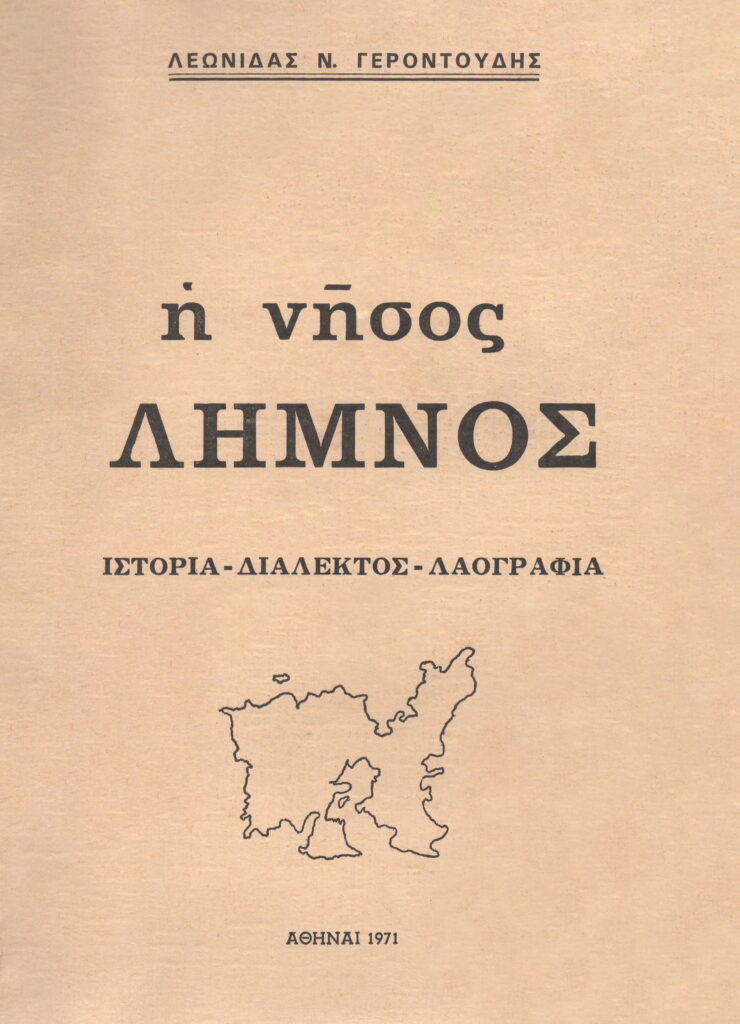The Island of Lemnos

The original purpose of the present book was to promote:
In the first part: The Grammar of the Lemnian Dialect.
In the second part: The Lemnian prose writing.
In the third part: The Free Lemnian verse, that is, the inherited Lemnian dialect to the liberated Lemnians on October 8, 1912 in all its forms.
We worked diligently for this purpose, initially for nine years and for three years thereafter, when enthusiastically, through its publication in the “Lesbian Chronicles” of Mytilene (without our knowledge), the professor, author and Headmaster of the Lemnos High school Mr. Dimitrios Mantzouranis manifested himself as follows:
THE LEMNIAN FOLK SONG
—Constantis the brave young man
Mr. Leonidas Gerontoudis has prepared a book with folklore and historical themes written in lyrics in the Lemnian Dialect. In his book he proposes the grammar of the language he uses.
The publication of this book is worthwhile for Lemnos and Greece in general.
The part that is published are excerpts of a folk song that the author managed to save from an old Lemnos villager. Unfortunately the full folk song cannot be published due to lack of space.
DIMITRIOS P. MANTZOURANIS
We were honored and encouraged thereby and for this reason we have intensified our efforts to enrich our present endeavor and indulge in the writing of the fourth book, convinced that by adding the historical part, we pay a tribute of supreme honor and gratitude to the most ancient inhabitants of Lemnos and to our ancestors who had been enslaved by the Turks.
The people of Lemnos, boasting that Greek blood flowed in their veins, especially that of the Argonauts, and firmly believing in the recovery of their lost freedom, did not bear fatalistically the yoke of the Turkish barbarism. They continued with passion, taught in the countryside or in the pens of the farms of the Turks, which were cultivated by Lemnian farmers, or in the basements under the dim light of the oil lamp, their Greek script and their mother tongue, aiming and desiring one and only one thing, to remain Greek.
Desiring to do so, we came into direct contact with the inhabitants of the Island, and after gathering a rich collection of folklore material, devoted ourselves to the composition of the unified Lemnian dialect, which was understood and spoken by all the Lemnians. In order to render more clearly these various events and to make our whole work easier to understand and useful to the scholars, whose apology and grace we invoke, we have divided it into four parts:
a) The History of Lemnos from the most ancient times until today.
b) “Prose writing” through dialogues, some of which we published in our newspaper “Voice of Lemnos” in the years 1946 – 1947 – 1948 – 1949 – 1950.
c) The Free Lemnian Lyrics, Myths, Songs and all the dances, which were set to music with our care, and
d) The Grammar of the Lemnian Dialect, which was prepared by us for the first time, without any help, in which we included the diminutives, the maxims, the proverbs, the insults, the curses, the oaths, the wishes and the pronunciation of numbering.
We also considered it appropriate to include in this book two interesting documents. Α Certificate of His Eminence Metropolitan of Lemnos Nectarios of 1833 and α Declaration of Constantine Denerikos of 1838, as belonging to the time of the proclamation of Greece as a free state, during which, as the in-depth reader observes, the literate slaves of Lemnos, unable to render fully in the Greek language, used, in semi-official documents, words and phrases in Turkish, as related to a real estate dispute between our maternal ancestors, namely Captain Konstantinos Makras, the first of the Lemnian seafarers, who sailed to Australia on a sailing ship, in the year 1867.
Because from the text of a), b), and c) parts of the book it is clearly proved that the people of Lemnos, for 443 years of slavery, largely preserved the subject of the words and succeeded in bequeathing one of the purest Greek dialects to us,
We proudly offer the present book to any good Lemnian, honoring the memory of its ancestors, as a page of the history of its small homeland and as a textbook of the spoken Lemnian dialect, to which, day by day, time brings about the deterioration and alteration of evolution.
In Kontias of the island of Lemnos, August 17, 1943
LEONIDAS N. GERONTOUDIS
